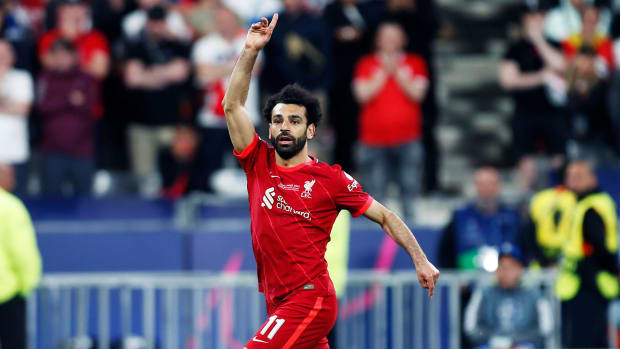Everything to Know for the Women’s World Cup Final
After a pair of exhilarating semifinal matches, the 2023 Women’s World Cup final has arrived, and it will end with a first-time winner.
Spain and England will face off Sunday at 6 a.m. ET, both making their first appearances in the final. And while there have been plenty of chaos and surprises in the last few weeks, these two squads have long been touted as contenders and have proved it throughout the knockouts.
After losing in the last two World Cup semifinals, the 2022 Euro champion England has finally broken through with a chance to finally bring it home. Spain, meanwhile, has powered through a public dispute between players and their manager and federation to not just get its first win in the knockouts, but to get a real shot at winning the whole thing.
With everything on the line, here are the top story lines and players to know, as well as our predictions for how things will unfold Sunday.

Wiegman (left) is coaching her second straight World Cup final after leading the Netherlands in 2019. Vilda (right) has been at the center of a controversy with players for almost a year.
Kim Price/IMAGO (Wiegman and Vilda)
A tale of two managers
England manager Sarina Wiegman and Spain manager Jorge Vilda have both been in the spotlight throughout the World Cup, but for vastly different reasons. If the Lionesses manage to pull off the win Sunday, it will be because of Wiegman; on the contrary, should Spain take the title it will undoubtedly be in spite of Vilda, setting up a confounding coaching head-to-head in the World Cup finale.
Wiegman is in a league of her own
There is no precedent for what Wiegman has achieved in the last few years, becoming the first manager to lead two nations to a World Cup final, coaching the Netherlands in its 2019 loss to the U.S. and now leading England against Spain in ’23. In the four major tournaments she’s participated in, Weigman has made it to the finals every single time, coaching the Dutch and Lionesses to the Euro titles in ’17 and ’22, respectively. “As a coach or as a player, that you make it to finals is really, really special. ... We’ve made it to four already,” Weigman said after her side’s semifinal win over Australia. “I never take anything for granted. … Am I in a fairy tale?”
It may be a storybook run for Wiegman and England, but it's no fluke that this group finds itself in the title match. Since taking the helm in 2021, Weigman has harnessed England’s impressive talent pool, empowering the team to rise to the level many believed players of their caliber were capable of. The Lionesses quickly developed into a highly disciplined team, one brimming with the confidence that comes only from being so thoroughly prepared for the task at hand. Wiegman was credited with helping to unlock Beth Mead during England’s Euro run, with the star forward earning the tournament’s Golden Boot award, logging six goals and five assists. The Dutch-born manager was remarkably consistent during the England-hosted tournament, relying on a core starting lineup and rarely deviating from it. In a bold move ahead of the Euros, Weigman made some tough decisions, the most controversial coming when she cut captain Steph Houghton from her roster.
Her assured managerial style didn’t steer her wrong in 2022, and it hasn’t yet at the World Cup either. Although Weigman was confronted with a daunting task, heading Down Under without stars Mead, Leah Williamson and Fran Kirby, all of whom were sidelined due to injury ahead of the tournament. Faced with a considerable personnel challenge, Weigman has deployed her oft-talked-about football mind, using various formations throughout the tournament, with England establishing itself as a tactically fluent and flexible team—a differentiator from many of its opponents.
Weigman has earned her spot as the top manager in women’s soccer today, but a World Cup trophy could put her among the best coaches in the history of the game.
The Spanish contradiction
Spain, on the other hand, represents one of the most irksome conundrums in soccer: a team succeeding despite its coach. In a not-all-that-uncommon phenomenon, players hold a mutual distaste for a manager, with the squad seemingly rallying around a common enemy, ostensibly bringing the group closer together. However, any type of success this dynamic may yield does not make the case for a hostile player-coach relationship. Contrary to what the Spanish federation may want you the believe, the ends don’t justify the means.
Vilda and the Spanish players have been at odds for some time now, with things coming to a head in the fall of 2022, when 15 members of Spain’s team issued a letter to RFEF (the Spanish federation) condemning their work conditions. Players expressed their concerns with the national team environment, citing a negative impact on their emotional and physical health, and made themselves unavailable for selection for Spain’s upcoming friendlies. In response to the letter, RFEF threw its support behind Vilda, even warning that rejecting a national team call-up could result in serious infractions, imploring the players to “accept their mistake and ask for forgiveness.” Three of those original 15 players, Mariona Caldentey, Ona Batlle and Aitana Bonmati, have worked their way back into the fold for the World Cup despite Vilda remaining with the Spanish national team, while stars like Mapi Leo and Claudia Pina remain away from the team due to the strife with the federation. Reigning Ballon d’Or winner Alexia Putellas was injured during the time the original letter was sent but publicly called out RFEF’s response to the player’s petition.
While Spain’s players have chosen to remain with or return to the team, relations with Vilda appear quite frosty. Videos of the coach celebrating the squad’s various wins alone have circulated the internet, along with a clip of Alexia swatting the coaching staff’s congratulatory high-fives away as she returned to Spain’s bench after putting in a shift. Given that, envisioning Spain winning the World Cup conjures up a lot of complicated feelings. The hope is that a victory of this magnitude will embolden the players, giving them leverage, rather than the federation leaving Australia feeling vindicated in dismissing its athletes.
Difference-makers

James (left) has scored three goals for England and Paralluelo (right) has scored two for Spain.
Keith McInnes/SPP/IMAGO (James); Kim Price/IMAGO (Paralluelo)
Alexia
There is no bigger difference maker in the World Cup final than Alexia. The Barcelona star is the first woman to win back-to-back Ballon d’Or honors—awarded for the best player in the world at the end of each calendar year—but there is one trophy missing. On Sunday, she will finally get a chance at a final with Spain.
At her best, there isn’t a midfielder in the world who can outperform Alexia. But there’s one big problem: The 29-year-old is still gradually making her way back to full strength from an ACL injury that kept her out for much of the last year. The semifinal against Sweden was only her third start of the tournament, and Alexia didn’t even last an hour after a mostly ineffective shift. How will she perform on the biggest stage while still shaking off the cobwebs? For the best player in the world, it’s a question that could very well decide the newest world champion.
Salma Paralluelo
While Alexia hasn’t quite lived up to pre-injury expectations, Spain has welcomed the breakout performance of 19-year-old Paralluelo. The teenage sensation made her debut with the national team back in November with a hat trick, and she hasn’t really slowed down since. A former track star, Paralluelo’s speed and energy have been key to her World Cup success. The winger started Spain’s first four games but came off the bench to score in the last two games, with the game winner against the Netherlands in the quarterfinal and Spain’s first against Sweden in the semifinal, when she subbed in for Alexia.
Vilda has turned to her as a lethal sub against tired opponents in the knockouts, but she has quickly shown that she’s capable of much more. Whether the manager chooses to start her again in the final or keep her as a second-half weapon, she’s bound to force the Lionesses to chase her around at some point, and England’s back line may want to save a bit of energy for that.
Keira Walsh
England’s biggest battle against Spain will take place in midfield, where La Roja’s game thrives. Spain’s tiki-taka rhythm is based on lots of possession and quick passing, lightly chipping away at a tiring defense until it finds a crack in the armor. The key to exposing that style of play was seen in Japan’s 4–0 dismantling of Spain in the Group C finale, where an organized defense sparked a lethal counterattack. As one of the world’s most skilled defensive midfielders, Walsh is England’s best chance at disrupting that rhythm, and she knows it well.
Last year the 26-year-old became the most expensive transfer in women’s soccer history when she made a £400,000 (roughly $509,000) move from Manchester City to Barcelona. Walsh proved to be the missing piece in Barça’s dynasty, helping the team to another Spanish league title and a return to the Women’s Champions League throne. But now Walsh knows the enemies’ secrets all too well, considering Spain’s play is based on Barcelona’s. Her familiarity with Barcelona and expertise in defensive midfield will surely be an advantage for the Lionesses up against her star Barça teammates Alexia and Aitana Bonmatí.
Lauren James
The 21-year-old has burst onto the scene as one of the world’s up-and-coming stars of the women’s game with an incredible World Cup so far. James leads England in scoring with three goals, and, combined with three assists, no one in the World Cup has contributed to more goals than she has. Even more incredible is the fact that James has done all of that while missing two games due to suspension. In a tense round-of-16 clash, James lashed out at Nigeria’s Michelle Alozie, stomping on her to earn a straight red card after a VAR review.
The Chelsea phenom says that she’s learned her lesson after sitting out the two games and nearly costing England a chance at advancing after the match went to penalties. Without her, however, England’s attack has found itself with five goals in the last two games as Lauren Hemp and Alessia Russo have found their rhythm together. Does Wiegman mess with that chemistry? We’ll find out.
Predictions
Andrew Gastelum: England wins, 1–0
A matchup featuring Spain’s possession-based strategy and England’s methodical approach has all the makings of a slow-burning final. Don’t expect a lot of goals and don’t expect a lot of early action with neither team looking to make that critical first mistake. But this will be tactical soccer chess at its finest, and there should be plenty for fans to latch onto.
Clare Brennan: England wins, 2–1
This World Cup final will feature a fascinating tactical battle, as both Spain and England like to play with the ball at their feet. The Lionesses, however, hold the slight edge, with James back in the mix, offering another look in the England attack. The 21-year-old’s firepower may be enough to overwhelm Spain’s backline, which has been particularly vulnerable on the counter.
Kristen Nelson: England wins, 2–0
A rematch of the 2022 Euro quarterfinal, this will be a tight and tense game. Spain will find a way to put on the pressure with its high-octane offense, but England’s experience in big games will come through. There will be plenty of close calls, and maybe even a late push from La Roja like against Sweden. In the end the Lionesses will find a way, just like they always seem to do.




